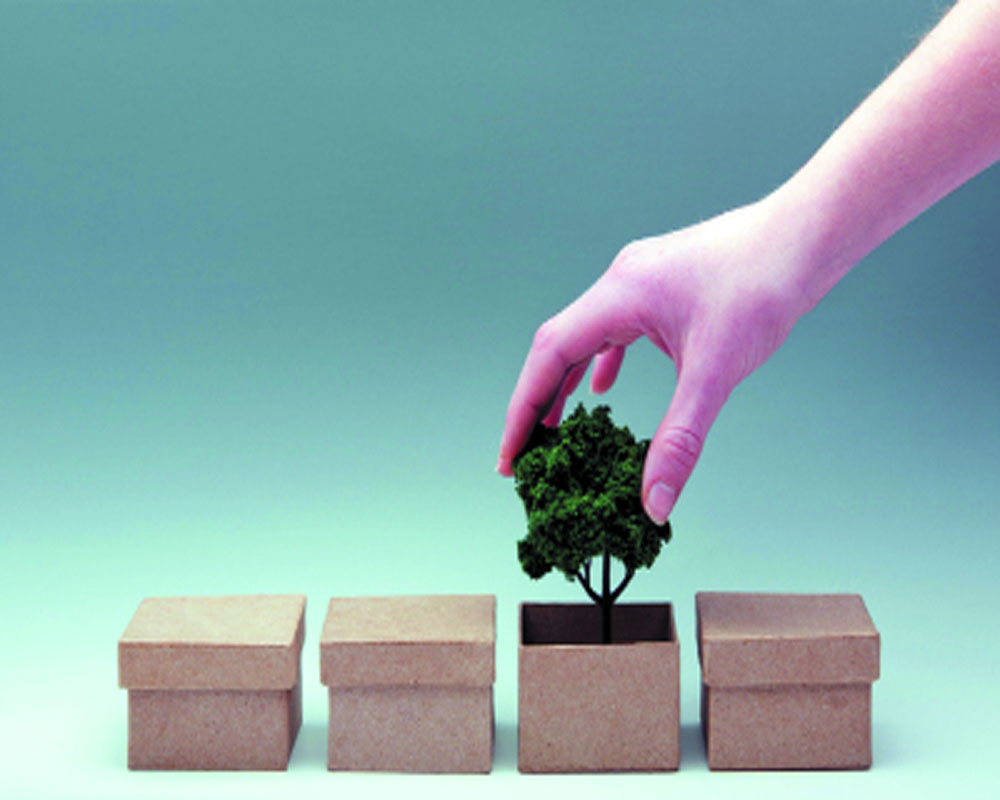Experts feel that determining a percentage today of how much biodegradable packaging actually gets decomposed in landfills could be very difficult. By Team Viva
As per the global data, the world has produced and discarded over nine billion tonnes of plastic since the 1950s. Around 165 million tonnes of it have clogged the oceans and since only about nine per cent of it gets recycled, the rest of the voluminous plastic pollutes the environment or gets stacked in landfills, where it takes more than 500 years to decompose while leaching toxic chemicals into the ground.
Looking at the domestic statistics, India produces an estimated 62 million tonnes of municipal solid waste annually — a figure which is likely to reach 165 million tonnes by 2030.
Initiatives by companies
After the World Economic Forum announced the aim for companies to reach 100 per cent reusable, recyclable and compostable packaging goal by 2025, many major companies, which represent over six million tonnes of plastic packaging per year, have taken the initiative to make packaging more sustainable.
Monica Bindra, CEO and co-founder, Laiqa (biodegradable brand of sanitary napkins), explains how can biodegradable packaging among more Indian companies can be promoted. She says, “It’s a new plastic economy in India and a lot of companies are moving towards biodegradable packaging. However, we need to go much further and faster in addressing the challenge of single-use plastics by leading a transition away from the linear ‘take-make-dispose’ model of consumption.”
She says that companies should embrace simplicity along with creativity to come up with minimalistic designs. “This will help in reducing material use, leading to an overall reduced product cost. Companies should promote more biodegradable packaging by training their staff. If they are aware of the waste disposal processes, they will better utilise it. This knowledge can then be passed from labour to labour.”
It was in 2007 when cosmetics company, L’Oreal Group announced its commitment to improve the environmental and social profile of 100 per cent of its products by 2025. In 2018, 79 per cent of new or renovated products have an improved social or environmental profile. For 58 per cent of new or renovated products, this improvement is due to packaging with a lower environmental footprint.
Krish Iyer, president and CEO, Walmart India, says, “Recognising plastic pollution as a critical issue, we have pledged to remove single-use shrink wrap used for storing merchandise and replace it with sustainable storage solutions across all its best price modern wholesale stores in the country in a phased manner.”
The Body Shop India has launched its first ‘Community Trade Recycled Plastic’ from Bengaluru, that highlights the lesser-known, human side of the plastic crisis. The company has unveiled a giant artwork of a female Indian waste picker in London’s Borough Market, which is made using recycled plastic from waste-pickers in Bengaluru.
SoulTree, an e-commerce service for herbal products, has introduced a ‘biodegradable bubble wrap’ as a part of packaging in all their website orders. The wrap decomposes in 180 days, without leaving a long-term impact on the environment. They also have biodegradable sachets to reduce plastic waste for other products.
Hindustan Unilever has “committed to accelerate a transition to a circular economy, moving from the take-make-dispose model to a regenerative approach, claims the company’s spokesperson, adding, “We have collected more than 20,000 tonnes of plastic laminate waste in partnership with NGOs and start-ups in more than 20 cities across India.”
Bans and percentage of degradation
However, the question remains — how much percentage of the packaging material actually decomposes?
Environmentalists claim that most landfills are too fundamentally crowded and compacted so tightly that they don’t allow space for much air. There’s not much dirt and very less of oxygen. And as a result, biodegradation of compostable materials takes place slowly. For instance, a study had recently uncovered 50-year-old readable newspapers.
In India, with plastic polythenes getting banned in major cities, the change has only begun. However, with more companies taking up the policy of 100 per cent sustainable packaging, even though 60-75 per cent of it could be degraded, experts claim that determining proper statistics isn’t possible since nothing has been produced so prominently.
Bindra said that determining a percentage today of how much biodegradable waste actually gets decomposed could be very difficult. “We cannot say how many companies have actually changed their design policy today. There is no proper data on how much plastic consumption has been reduced by them to compare it with their previous statistics.”
Dr Tanweer Alam, joint director and regional head, Indian Institute of Packaging (IIP) Delhi, talks about how banning plastic use at various levels really helps. “The ban surely puts the onus on the polluters/ brand owners, but some exceptions have been made by companies so that businesses are not hampered until alternate solutions are developed and implemented successfully.”
It also depends on the kind of materials companies employ to produce the alternatives for plastic packaging. Suggesting some of the key aspects that need to be taken into consideration for companies before trying to identify the most environment-friendly packaging materials, Alam says, “First, the pollutants released when the packaging material is produced should not be ignored. If a particular product cannot be produced without release of toxins into the environment, then it cannot be considered as ecologically responsible. Another aspect is whether the material is recyclable or not. Also, innovative, sustainable and stylish, green food packaging can be recycled again and consumes less than 0.5 per cent of the space of traditional food packaging if dumped in a landfill.”
Designing a no-plastic policy
Apart from the triple-R (Reduce, Reuse, Recycle) phenomenon, environmentalists say that the first and foremost work should be to construct a no-plastic policy, which starts from landfills and their design technology. Some landfills are now being designed to promote biodegradation through the injection of water, oxygen and even microorganisms. However, these kinds of facilities are costly to create, which is why they haven’t been widely considered.
Alam suggests that landfills could be designed in a way that they can have “separate sections for compostable materials” like food waste.
Bindra feels that plastic can’t be completely abolished. However, we can focus on using it the right way. She suggests, “Companies should always ask if they still want disposable carrier bags, given that they are burned after a few minutes of use. Investing in creative and innovative ways of delivering products to people without generating plastic waste can help solve the challenges involved. Companies ought to design their packaging keeping in mind what happens to it after use. They should follow the lead of brands that have pledged to use 100 per cent reusable, recyclable or compostable packaging. A collaborative reduction of plastic protocol should be defined to provide common direction. Industries should align on material choices, that will guarantee compatible materials that can be recycled and reused.”
Looking at oxo-degradable plastics, which are also biodegradable, one more aspect comes to notice — being biodegradable does not necessarily mean that a material is eco-friendly. Alam argues that oxo-degradable bags can’t be recycled and are the ones which actually hamper the recycling process. He says, “Although these plastics break down over time, the tiny pieces they break down into are still plastics that might contribute to pollution. They don’t degrade into nothing or anything usable. Hence, this aspect is very important when we talk about biodegradable packaging materials.”
(IIP’s national conference on ‘innovative packaging techniques for food products’ will be held at Le Meridien today.)


























